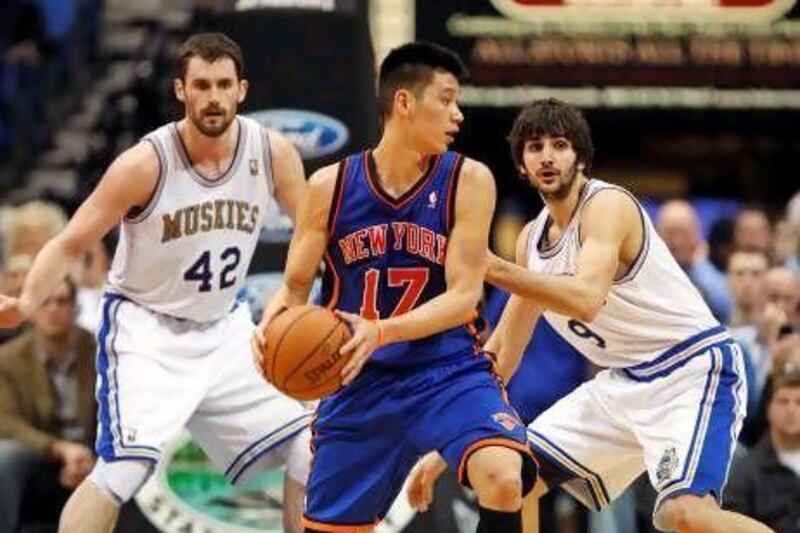On the morning of February 4, everything we knew about the NBA and a young man named Jeremy Lin would lead us inexorably, nine days later, to the following conclusion: this cannot be happening.
Harvard men do not succeed at the highest level of basketball. Undrafted players do not succeed at the highest level of basketball. Players released by two teams … players who spend time in the NBA's development league … and, let's acknowledge the elephant in the room, players who are Asian-Americans do not succeed at the highest level of basketball.
It is the sheer astonishment of what the 23-year-old Lin has accomplished in these nine days that has electrified the basketball world, with the biggest jolts being felt in New York, the long-suffering epicentre of game; in the Far East; and among the Asian-American community in the States.
In five games, encompassing four starts, Lin is averaging 26.8 points and 8.0 assists, while making 51.5 per cent of his shots. His team, the New York Knicks, have won all five of those games, with "Lin-sanity" reviving what had been a failing season.
"I feel like I'm in a dream," Lin said late on Saturday night, after scoring "only" 20 points in a road victory over the Minnesota Timberwolves.
Anyone interested in basketball is sharing that REM stage with Lin, because most of us now know the outlines of his unlikely background.
The Chinese-American kid, a deeply religious 6ft 3in (1.91m) son of immigrants from Taiwan, gained an appreciation for basketball from his father, who stands 5ft 6in; led his high school team in Palo Alto, California, to a state championship but was not recruited by a major basketball school.
He went to Harvard, got a degree in economics, carried the Crimson, in 2010, to their best season in, approximately, forever, ignored in the 2010 NBA draft, impressed the Golden State Warriors in a summer league to gain a contract, and last season became the first Harvard man in nearly half a century to enter an NBA game.
Released by the Warriors in December, picked up and released by the Houston Rockets, picked up by the Knicks in late December to be their No 4 point guard, banished to the development league three weeks ago, recalled, given 20 minutes off the bench on January 25, then thrust into the game early on February 4 by a desperate coach whose team was 8-15 and perhaps getting ready to fire him.
None of that prefigured this: games of 25, 28, 23, 38 and 20 points, the five consecutive victories for a club playing without their two best players, Carmelo Anthony and Amar'e Stoudemire, and a pair of giddy heights: a crossover dribble leading to a dunk against the Washington Wizards, and outscoring Kobe Bryant 38-34 in a victory over the Los Angeles Lakers.
The league is in an uproar. Many are hauling themselves aboard the Jeremy Lin bandwagon. "He is for real. For real," said Earvin "Magic Johnson", a Hall of Famer and a television analyst, who compared him to Steve Nash and John Stockton, the two best point guards from the past 20 years. "He is not a fluke," said Lin's teammate Tyson Chandler.
Statistic wonks also suggest he is "legit". Nate Silver of the New York Times found 41 NBA players who since 1976 had similar four-game streaks of at least 20 points, six assists and 50 per cent shooting, and 32 of the 41 were players he ranked "above average" or better, including 11 "all-time greats". Only three had "mediocre" careers.
Some Asian-American analysts mined deep cultural significance from Lin's success, which has shaken the US immigrant meme of "great students, poor athletes". The blogger Danny Chau, after the 38-point game, wrote: "I struggle to think of another moment where we as a community had been so proud of who we are."
The nub of it all? The NBA often mistakes stiffs for great players; never does it mistake a possibly great player for a stiff. Lin and those around him have been candid; they believe his ethnicity blinded the league to his subtle skills of passing and movement, and a potentially significant figure has arrived full-blown.
Some suggest he will crash to earth, citing questions about his shooting and defence, predicting he will wilt as opponents focus on him. Prudent observers no longer know what to believe. Conceded Daryl Morey, the general manager of the Rockets: "The reality is, he has done more than all 30 NBA teams thought he could do."
Just like the rest of us.





